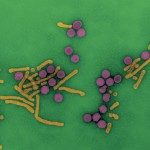Lien vers Pubmed [PMID] – 10487827
Am. J. Pathol. 1999 Sep;155(3):703-10
Inappropriate activation of the Wnt pathway resulting from beta-catenin gene alterations has recently been implicated in the development of hepatocellular carcinoma (HCC). To explore the in vivo effects of mutated beta-catenin, HCC specimens from 32 patients carrying one or several tumors were screened for somatic mutations in exon 3 of the beta-catenin gene, and the expression and subcellular localization of beta-catenin was studied by immunohistochemistry. Missense mutations or interstitial deletions in beta-catenin exon 3 were detected in 12 of 35 (34%) HCC samples. After immunostaining, most tumors exhibited increased membranous and/or cytoplasmic expression of beta-catenin compared with adjacent nontumoral liver. Strong nuclear accumulation of beta-catenin was observed either focally or uniformly in 15 of 35 (43%) tumor specimens, but not in cirrhotic nodules or dysplastic liver cells in adjacent liver. Aberrant nuclear expression of beta-catenin was significantly associated with the presence of mutations in the beta-catenin gene (P < 0.005). Moreover, nuclear beta-catenin staining correlated significantly with increased Ki-67 proliferative index in tumor (P < 0.001) and seemed to be associated with poor outcome in patients with HCC. In conclusion, our data indicate that activation of the Wnt/beta-catenin pathway in HCC results mainly from somatic mutations in the beta-catenin gene and may promote tumor progression by stimulating tumor cell proliferation.

